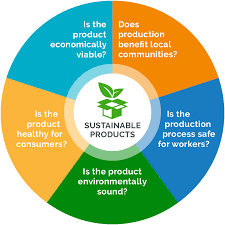The Importance of Sustainable Living
In today’s world, the concept of sustainability has become increasingly important. With growing concerns about climate change, environmental degradation, and resource depletion, more and more people are turning to sustainable living practices as a way to reduce their impact on the planet.
Sustainable living involves making choices that have a positive impact on the environment, society, and economy both now and in the future. It encompasses a wide range of practices, from using renewable energy sources and reducing waste to supporting local businesses and adopting eco-friendly habits.
One of the key benefits of sustainable living is its potential to help mitigate climate change. By reducing our carbon footprint through actions such as using public transport, cycling instead of driving, or installing energy-efficient appliances in our homes, we can lower greenhouse gas emissions and slow down global warming.
Additionally, sustainable living promotes biodiversity conservation by preserving natural habitats and protecting endangered species. By choosing sustainably sourced products and supporting ethical farming practices, we can help safeguard the planet’s ecosystems for future generations.
Moreover, sustainable living can have positive social impacts by promoting fair trade practices, supporting local communities, and fostering economic resilience. By prioritising ethical consumption and investing in sustainable businesses, we can create a more equitable society where everyone has access to resources and opportunities.
In conclusion, embracing sustainable living is not just a personal choice; it is a collective responsibility towards creating a better future for our planet and all its inhabitants. By making conscious decisions in our daily lives that prioritise sustainability, we can contribute to a healthier environment, stronger communities, and a more prosperous world for generations to come.
Understanding Sustainability: Key Questions and Answers
- What is the term for sustainable?
- What are 3 ways to be sustainable?
- What do you mean by sustainable?
- What is sustainability in 1 word?
- What is the definition of sustainable use?
- What is an example sustainable?
What is the term for sustainable?
The term commonly used to describe practices that meet the needs of the present without compromising the ability of future generations to meet their own needs is “sustainable.” Sustainability encompasses a holistic approach to environmental, social, and economic well-being, aiming to create a balance that supports long-term viability and resilience. By adopting sustainable practices in various aspects of life, we can contribute to a healthier planet and ensure a more sustainable future for all.
What are 3 ways to be sustainable?
When considering ways to be sustainable, there are three key practices that individuals can adopt to make a positive impact on the environment. Firstly, reducing energy consumption by using energy-efficient appliances, turning off lights when not in use, and opting for renewable energy sources can significantly lower carbon emissions and promote sustainability. Secondly, minimising waste through practices such as recycling, composting organic materials, and choosing reusable products over single-use items can help conserve resources and reduce landfill waste. Lastly, supporting local and ethical businesses, embracing eco-friendly transportation options like cycling or public transport, and advocating for sustainable practices in your community can contribute to a more sustainable lifestyle overall. By incorporating these practices into daily routines, individuals can play a vital role in promoting sustainability and protecting the planet for future generations.
What do you mean by sustainable?
“Sustainable” refers to practices or actions that meet the needs of the present without compromising the ability of future generations to meet their own needs. In essence, sustainability involves making choices that consider the long-term impact on the environment, society, and economy. It encompasses strategies to conserve resources, reduce waste, promote biodiversity, and support equitable development. By embracing sustainable practices, individuals and communities can contribute to a more balanced and resilient world for both current and future generations.
What is sustainability in 1 word?
Sustainability, in essence, can be encapsulated in one word: balance. It represents the delicate equilibrium between meeting present needs without compromising the ability of future generations to meet their own needs. By striving for balance in our actions and choices, we can ensure a harmonious coexistence with the environment, society, and economy for a sustainable future.
What is the definition of sustainable use?
Sustainable use refers to the responsible and balanced utilization of natural resources in a way that meets present needs without compromising the ability of future generations to meet their own needs. It involves managing resources in a manner that ensures their longevity and availability for future use, while also considering environmental, social, and economic factors. Sustainable use aims to strike a harmonious balance between human activities and the preservation of ecosystems, biodiversity, and overall environmental health. By adopting sustainable practices, we can ensure that we meet our current needs without jeopardising the well-being of future generations or depleting vital resources beyond repair.
What is an example sustainable?
An example of sustainability in action is the use of solar panels to generate electricity. Solar energy is a renewable resource that harnesses the power of the sun to produce clean and sustainable electricity without emitting harmful greenhouse gases. By installing solar panels on rooftops or in solar farms, individuals and communities can reduce their reliance on fossil fuels and contribute to a more sustainable energy future. This eco-friendly technology not only helps to lower carbon emissions but also promotes energy independence and resilience in the face of climate change challenges.

Leave a Reply